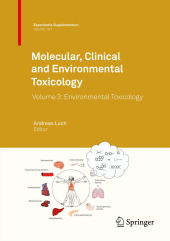 Neuerscheinungen 2012Stand: 2020-01-07 |
Schnellsuche
ISBN/Stichwort/Autor
|
Herderstraße 10
10625 Berlin
Tel.: 030 315 714 16
Fax 030 315 714 14
info@buchspektrum.de |

Andreas Luch
Environmental Toxicology
Herausgegeben von Luch, Andreas
2012. xii, 574 S. 38 SW-Abb., 8 Farbabb. 235 mm
Verlag/Jahr: SPRINGER, BASEL 2012
ISBN: 3-7643-8339-9 (3764383399)
Neue ISBN: 978-3-7643-8339-8 (9783764383398)
Preis und Lieferzeit: Bitte klicken
Environmental Toxicology is the third volume of a three-volume set on molecular, clinical and environmental toxicology that offers a comprehensive and in-depth response to the increasing importance and abundance of chemicals of daily life. By providing intriguing insights far down to the molecular level, this three-volume work covers the entire range of modern toxicology with special emphasis on recent developments and achievements. It is written for students and professionals in medicine, science, public health or engineering who are demanding reliable information on toxic or potentially harmful agents and their adverse effects on the human body.
Chemical hazards in the organization.- Toxicology of water.- Perfluorinated compounds.- Toxicologically relevant phthalates in food.- Exposure to polycyclic aromatic hydrocarbons: bulky DNA adducts and cellular responses.- Heavy metals toxicity and the environment.- Toxicology of ambient particulate matter.- Nanomaterials: a challenge for toxicological risk assessment? Immunotoxicology and its application in risk assessment.- Chemical sensitization and allergotoxicology.- Male reprotoxicity and endocrine disruption.- Interspecies uncertainty in molecular responses and toxicity of mixtures.- Recent trends in QSAR modeling of environmental chemical toxicity.- Chirality and its role in environmental toxicology.- Genetic variability in molecular responses to chemical exposure.- Biomarkers in toxicology and risk assessment.- A personalized life: biomarker monitoring from cradle to grave.- Low dose effects and epigenetics.- Hormesis: improving predictions in the low dose zone.


